Friday, March 31, 2006
Peaceful Protest at City Hall--Uncanny Timing!
The noise filled the entire building. From our vantage point inside the council chambers, things sounded like a pep rally in a charged up high school gymnasium.
The fact that the two events were occurring simultaneously struck me as quite remarkable.
Following the council meeting, everyone walked out into the "flag room" just outside the council chambers. Thanks to a glass wall, we enjoyed a perfect view of the large plaza and giant reflection pool just outside the front door. As security personnel and police ushered the students out of the building, they continued their peaceful, now joyous protest on the plaza.
Soon several decided to take a dip in the fountain!
It was a sight to behold.
News reports carried a few stories and letters to the editor regarding the protest and the students, some not so flattering. Most folks think these kids needed to stay in school. Their action on Tuesday was the second day this week that hundreds refused to attend classes.
I know the students need to be in class. And by today it seems that everyone is back where they need to be. I also realize that not every student involved fully understood the issues involved with the current immigration debate.
That said, I guess I have a slightly different take on it overall.
The students I observed were orderly, polite and determined, it seemed to me.
It also seemed clear that they understood at least something of what had been happening in our Congress and across the nation and how it all might affect them and their parents.
Mainly, they were involved.
I couldn't help but smile.
Interestingly, on Monday the U. S. Senate passed out of committee the McCain-Kennedy proposal that effectively negates the extremely strident legislation the U. S. House of Representatives came up with. The national debate is joined again on this crucial matter.
In the days ahead I'll probably have more to say about the issue, including some thoughts on the nature and necessity, at times, of civil disobedience; the need to take a fresh look at the wages paid working people in our nation; the place of history, culture and race in the current conversation; and how all of this affects urban life.
For now it is enough to confess that I left City Hall on Tuesday just thankful to see the children involved in the civic discussion.
Thursday, March 30, 2006
My Best Friend, Eddie Wilson
He lived just across the street from me all those early years.
We weren't much alike really.
I remember him sitting for what seemed like hours reading World Book encyclopedias. Me, I was always trying to get him outside to play baseball or our special version of "home run derby."
I recall on one occasion during the hot, Texas summer, we built a 9-hole golf course on the vacant lot behind his house. Our makeshift ball field was marked out on the lot next to my house.
We rode our bikes from one end of town to the other almost every day.
His grandparents lived out in the old town of Renner--totally "condoed over" these days! We often visited the 1st Baptist Church of Renner, especially during Vacation Bible School in the summer.
We pretty much did everything together, even after we reached high school.
I remember he was the student trainer for our football team at Richardson High School our senior year. I played on the team.
We tried to stay in touch after graduation. He visited me during two-a-day football workouts that first year I was in college. I actually think he wanted to be in school where I was, but it never worked out.
We was best man in my wedding. I performed the wedding ceremony the first time he married.
But after we both married, we just didn't see each other much.
He dropped out of college and went to work for the U. S. Postal Service.
For years we called each other on our birthdays and we exchanged cards.
But, then something just happened to him.
He disappeared from my life. He moved to another part of the state. Our contact was less and less frequent.
After both of his parents died, all of our contact pretty much came to an end.
I ran into him and his second wife at a shopping mall one evening and we talked for a little while.
I hadn't heard from him for years, nor had many of his family members on his mom's side. . .until a few days ago.
Eddie Wilson died in East Texas pretty much alone early last week.
The pain hit me pretty hard in a surprising way. I guess growing up like brothers, both of us being only children, made a larger indent on my soul than I had ever realized or understood.
I catch myself thinking of him every day now. And do I have some memories!
I wish I had tried harder to re-connect.
He was my best friend. And, I realize like never before that counts for an awful lot in life.
Rest in peace, Pads.
Wednesday, March 29, 2006
Dallas City Council Says, "Go!"
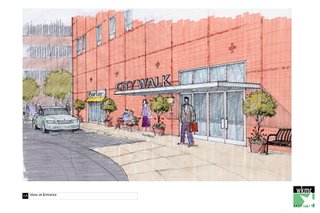
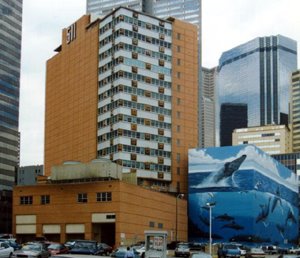
Yesterday after two hours of discussion and briefing, the Dallas City Council voted 13-1, with one member absent, to endorse our application to the Texas Department of Housing and Community Affairs (TDHCA) for low-income, housing tax credits .
In addition, the Council approved funding totaling $1,750,000.
One million dollars would come from the recently approved bond funds voted for the Homeless Assistance Center last November, part of which was to be set aside for permanent housing.
The remaining three-quarters of a million dollars would be a forgivable loan from the housing acquisition funds supplied by Community Development Block Grant revenue.
To state the obvious, we were ecstatic about the results!
That said, we still have a long way to go on the project.
Next must come approval of our project from TDHCA. If granted, we anticipate receiving between $11-12 million in tax credit revenue that would make the project fiscally possible.
Remember us!
Working on this effort has been incredibly fascinating and, at times, very, very frustrating.
But, talk about an education and a steep learning curve!
Our chief opposition came from a church group. Or, more accurately, a private Christian school located inside a downtown church building.
The opposition was very civil and courteous, but firm. We are committed to working with the group to see that our project is a true asset to everyone downtown, including all of their students. We look forward to the day when their choral groups perform in our theater in the building!
To read a report in today's Dallas Morning News, go to:
http://www.dallasnews.com/sharedcontent/dws/dn/latestnews/
stories/032906dnmettower.6d9c555b.html
When I get weary, I always find my heart moving toward that classic old Hebrew passage found in Isaiah the prophet at the 58th division, verse 12:
"Your people will rebuild the ancient ruins and will raise up age-old foundations; you will be called Repairer of Broken Walls, Restorer of Streets with Dwellings."
Let me say it again. Remember us.
Tuesday, March 28, 2006
Immigration and Our Friends in the City

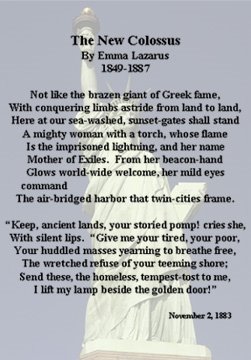
News of an extremely strong immigration reform bill working its way through the U. S. House of Representatives reached us about two months ago.
One provision of the proposed legislation got our attention big time. The way I read the bill it would become illegal, and punishable by severe fines and imprisonment, to render any compassionate, social services-type assistance to undocumented immigrants.
Sounded so impossible that I ran the language of the bill by Ken Koonce, one our lawyers. Sure enough, Ken reported back that my reading of the law was correct.
H.R.4437, officially titled "Border Protection, Antiterrorism, and Illegal Immigration Control Act of 2005," has been reported out to the U. S. Senate that begins debate on the controversial bill this week.
Hmmmm. . .terrorists of Mexican descent???
The language in the bill is fairly clear:
SEC. 202. ALIEN SMUGGLING AND RELATED OFFENSES.
(a) IN GENERAL- Section 274 of the Immigration and Nationality Act (8 U.S.C. 1324) is amended to read as follows:
ALIEN SMUGGLING AND RELATED OFFENSES
SEC. 274. (a) Criminal Offenses and Penalties-
(1) PROHIBITED ACTIVITIES- Whoever--
knowing or in reckless disregard of the fact that such person is an alien;
(C) assists, encourages, directs, or induces a person to reside in or remain in the United States, or to attempt to reside in or remain in the United States, knowing or in reckless disregard of the fact that such person is an alien who lacks lawful authority to reside in or remain in the United States;
Ken tells me that it would be a hard case to bring against people like those at Central Dallas Ministries who interact on a daily basis with hundreds of undocumented residents who live and work in Dallas.
Still, the law out of the House is clear in language and intent.
Over the past weekend, hundreds of thousands of people marched in the streets of cities as different as Atlanta, Dallas, Phoenix and Los Angeles.
The protesters were simply calling for the nation to recognize the reality that is at work everywhere.
Here in Dallas undocumented immigrants help make the city work.
Remove them and the city is crippled.
Thankfully, there are very different ideas over on the Senate side.
Senators McCain and Kennedy have co-sponsored a bill that would help 11 million undocumented persons move over a six year period to legal status, including paying fines, back taxes and learning English.
Texas Senator John Cornyn stands somewhere in the middle between the extremely conservative ideas of the House and the clearly expressed needs of business leaders who feel the need for immigrant labor.
Does faith have anything to contribute to this debate?
The Hebrew Bible exalts the place of the "alien" and the "stranger" in Israel's national law, recognizing that the Israelites were at one time immigrants in Egypt. Such persons were to be welcomed and treated with justice.
Jesus identified with the "stranger," telling his followers on one occasion that when they welcomed, cared for and included such persons, they were welcoming, caring for and including him.
The notion of paying fair wages for labor rendered also has a prominent place in both Hebrew and Christian literature and values.
I know one thing for sure, the hatred I've witnessed at work among some anti-immigrant protesters cannot be right.
And then, there is the whole "Stature of Liberty" thing--the welcoming immigrants tradition and national value that I always thought was a part of what it meant to be America.
Sunday, March 26, 2006
"Red Letter" Christians

Jim Wallis is a friend of mine and of Central Dallas Ministries.
I just got around to reading through the March 2006 issue of Sojourners, the magazine Jim serves as editor-in-chief.
I've pasted his provocative essay below. It is a must-read!
__________________________
Red Letter Christians
Somehow, Jesus has survived even the church
“I’m a secular Jewish country music songwriter and disk jockey,” my interviewer on a Nashville radio station said. “But I love your stuff and have been following your book tour.” He told me he loved my “riffs” and would like to spend an evening together just to get some lines for new music. “You’re a songwriter’s dream.” Then he told me he believed we were starting a new movement, but noticed we hadn’t come up with a name for it yet. “I’ve got an idea for you,” he said. “I think you should call yourselves ‘The Red Letter Christians,’ for the red parts of the Bible that highlight the words of Jesus. I love the red letter stuff.”
The truth is that there are many people who like the “red letter stuff,” and many of them are not even Christians. Try it yourself sometime. Go out on the street or to your school or workplace and take a poll. Ask people what they think Jesus stood for. You’re likely to hear things like “stood with poor people,” or “compassionate,” or “loving,” or “he was for peace.” Then ask them what Christians or the church stand for. And you’re likely to hear some very different things.
We have a problem. Most people have the idea, as crazy as it may seem, that Christians and the church are supposed to stand for the same things that Jesus did. And when they don’t, people get confused and disillusioned. It’s a problem.
When Jesus tells us he will regard the way we treat the hungry, the homeless, the stranger, the sick, and the prisoner as if we were treating him that way, it likely means he wouldn’t think capital gains tax cuts for the wealthy and food stamp cuts for the poor represent the best domestic policy. Or when he tells us “love your enemies” and “blessed are the peacemakers,” it might be hard to persuade him to join our “war against terrorism,” especially when there is so much “collateral damage” to civilians, including women and children.
Yes, Jesus is a problem —for many of our churches, the Wall Street traders, and the powerful people in Washington who maintain the American Empire. But for millions of people, religious or not, Jesus remains the most compelling figure in the world today. The church may not be much more credible than the advertisers, the media, or the politicians, but Jesus remains far above the rest of the crowd. Somehow, Jesus has even survived the church and all of us who name his name but too often forget most of what he said. Two new books are calling us to meet Jesus again.
This issue includes a section of Brian McLaren’s new book, The Secret Message of Jesus—a message often kept secret even by the churches themselves and utterly disguised by many of our television evangelists who seem to preach a different gospel. Brian is the spiritual leader of a new movement called the “emergent church,” which is drawing a generation raised in the churches back to Jesus and attracting many outside the religious community to a Jesus they never heard about from the churches. He knows that people intuitively recognize that Jesus’ message of God’s kingdom—a new world of compassion, justice, integrity, and peace—is the good news they’ve been searching and waiting for.
Read the excerpt, get the book, and learn the message of Jesus all over again—or maybe for the first time.
Shane Claiborne is a good example of the old adage, “Be careful what you pray for.” Evangelicals like to pray that Christian young people will learn to love Jesus and follow in his steps. Well, that’s exactly what this young Christian activist is talking about in his book The Irresistible Revolution. But the places that following Jesus have led him are not the comfortable suburbs and cultural habits of many evangelical Christians. Worst of all, his notions of fidelity to the gospel seem to directly counter the political loyalties that many conservatives on the Religious Right have made into an almost doctrinal litmus test.
For several years, Shane has been living the gospel on the streets of Philadelphia and Calcutta, in the intensity of Christian community, and even in the war zones of Iraq. In his book, he takes us on pilgrimage with him—sharing his passions while admitting his uncertainties, critiquing his society and his church while admitting his own human frailties and contradictions, revealing his hopes for changing the world while embracing the “smallness” of the efforts and initiatives he holds most dear.
They call their community “The Simple Way” and believe that by plunging deeper into what the earliest Christians called “The Way”—the way of Jesus, the way of the kingdom, and the way of the cross—they rediscover the biblical reversal of our social logic: that the foolishness of God has always seemed a little nuts to the world. I found the reading of this book a delight, as I also find the author. Read it and find your hope rise.
The landscape of religion, society, and politics in America is being transformed. As I crisscross the country, I feel a new momentum and movement. Perhaps the greatest sign of hope is the emergence of a generation of Christians eager to take their faith into the world. The Christianity of private piety, affluent conformity, and only “God Bless America” has compromised the witness of the church while putting a new generation of Christians to sleep. Defining faith by the things you won’t do does not create a compelling style of life. And a generation of young people is hungry for an agenda worthy of its commitment, its energy, and its gifts.
Brian’s and Shane’s books are evidence that believers are waking up and catching on fire with the gospel again. Their vision can’t easily be put into categories of liberal and conservative, left and right, but rather has the capacity to challenge the categories themselves. These books are a manifesto for all those “red letter” Christians who have fallen in love with Jesus again and want to live their faith in this world, and not just the next. God is again doing something new.
Saturday, March 25, 2006
Downtown Life—What Shape Will It Take? And, For Whom?

America’s downtown areas find themselves in the midst of a resurgence for sure.
Recently, The Brookings Institute conducted a study of the past 30 years in the nation’s central cities to see what was up.
Their findings seem important.
--During the 1990s, downtown populations grew by 10%--this followed two decades of steady and dramatic decline.
--Downtown areas are home to some of the most and the least affluent households of their regions. Twenty of the downtown areas studied—including Dallas—have at least one tract of housing in which the median income is higher than the surrounding metropolitan areas. In addition, 38 have at least one housing tract 50% or more lower than the median incomes of their respective regions. Rich and poor live in close proximity in many downtown areas.
--Downtowns have a higher percentage of both young adults and college-educated residents than the nation’s cities and suburbs.
--In 2000, 25- to 34-year-olds represented nearly 25% o the downtown population—up from 13% in 1970.
--Approximately 44% of people living downtown had earned a bachelor’s degree or higher.
Dallas is definitely experiencing a “boom” downtown.
Upscale loft conversions are going on in lots of old, abandoned buildings.
Luxury condos fill out the redesign of old, once long-vacant office towers.
I saw a sign just last week that read, “Live in luxury, walk to work!”
No doubt, the face and shape of downtown America is being transformed.
Who will be allowed to “play” in this new game?
Who will be shut out?
If you are interested in the full report from Brookings, take a look at http://www.brookings.edu/.
(My thinking for this post started with a brief essay and summary of The Brookings report found in Affordable Housing Finance magazine, January 2006, page 6.)
Friday, March 24, 2006
Walter is my friend
Walter comes to my door so often. In my inner city neighborhood it is not uncommon at all. People show up asking for help.
Walter is a regular.
And, he has received a "hand up" on more than one occasion, and not just from me.
Two weeks ago we found a way to get him and his wife into one of our apartments. He was thrilled and relieved. Life on the streets of East Dallas can be really tough.
Walter is a recovering addict. His wife's struggle has been much worse.
He showed up at my door last night at about 9 p.m. with some story about needing cash to buy ant killer.
I gotta hand it to him, that is a new one!
I lost it!
Forgive me, Lord.
I dressed him down. Read him the riot act.
"You're pushin' me, man!" I told him.
"You're really pushin' me," I repeated.
He backed way off.
"Your assignment is to work, pay your rent on April 1 and not come to my house at 9 p.m. with some crazy story about ant killer!" I almost shouted this time.
It is this way here.
All is not sweetness and light.
We aren't all kindness and affection.
Love is brutal at times. I am learning this.
Plus, we are very, very human!
But, Walter is too precious to be let off the hook. He must step up.
Poverty does things to people--stresses them, strings them out, makes them lie and fantasize.
Poverty is brutal.
Pray for me.
Pray for Walter.
I have hope for him.
When we call for public policy justice again and again, please know and understand that we are also insisting, as best we can, on accountability among the poor as well.
Thursday, March 23, 2006
Lifestyle. . .
Wednesday, March 22, 2006
So, What Does Faith Mean?
The circumstances of an editorial decision force it upon me.
Sorry.
What does faith mean today?
More particularly, what does it mean in an urban context as complicated as this one?
Yesterday in the "Metro" section of The Dallas Morning News the editor positioned two stories side-by-side (Page 7B).
The juxtaposition was provocative.
On the left top of the page was the story I referenced yesterday concerning the public meeting Dallas City Council member Angela Hunt hosted to discuss our plans to develop an old, abandoned office building downtown to house low-income and formerly homeless people.
On the right top was a story that carried the title, "Plano district is sued again."
It seems that a student group at Haggard Middle School is suing the Plano Independent School District for removing information about a student Bible study group from the public school district's official website.
The group's name is interesting: "Witnessing Absolute Truth."
I think I need to get in on that group's life, wisdom and guidance. I mean its not every day that you run into absolute truth!
The proximity of these two news reports forced the question on me. What does faith mean?
Is faith about imposing one's point of view about the Bible on others?
Is faith all about convincing people that you actually have discovered "absolute truth"?
Does faith mean that because I am part of the majority class and culture that I should angle for establishing my faith as the singular expression of truth for everyone else?
Or, could it be that faith is really more about humility in the face of life's more than perplexing reality?
Is it possible that the nature of the teachings of this strange guy named Jesus is more about service than imposition? Could it be that what he had in mind was a selfless lifestyle so radical that even in its quietness it could not be ignored?
Is the Christian faith about law suits and arguments that promote one worldview over all others?
Or, could it be that following Jesus actually has more to do with how we treat the chronically, ever-present poor?
Is faith about school-based Bible studies? Or, is it about justice for the poor?
Where should the weight of our influence and energy fall?
Believe me, I don't have anything against kids studying the Bible. But if the agenda is to establish the superiority of one view against another, I have to wonder if it is really modeling the behavior of the founder of the religion being promoted.
Jesus said more about the poor than he did about claiming superiority over others as religious people. As a matter of fact, he said nothing about superiority, unless you count what he said about avoiding it!
If memory serves me correctly, he reserved his harshest criticism for religious folks who claimed to hold title to all truth.
I doubt he would have joined this lawsuit as a co-plaintiff.
Funny how life works out in an eerie parallel to life in the news.
Our most anxious opposition about our housing efforts always seems to involve some religious people who are more concerned about their own rights than they are about reaching out to the urban poor.
Could it be that faith is all about our response to the pain of the world?
Could it be that faith will concern us so much with the injustice and oppression of the weak and vulnerable that we just won't have time to impose any of our theories on our neighbors or classmates?
Is it possible that faith seen in action is more powerful than faith claimed in words or imposed on others as an expression of our rights?
What would the world be like if we and our children sued on behalf of the neglected poor rather than on behalf of their own rights and agendas?
Who knows? God might smile on us all.
Tuesday, March 21, 2006
More on 511 N. Akard
It contained a lead editorial by Frances Gordon entitled, "Well-Heeled Ghetto?" that would be worth your reading.
You can find it at:
http://dallas.bizjournals.com/dallas/stories/
2006/03/20/editorial3.html.
As you'll see, it offers a very positive assessment of our proposed downtown housing development for our formerly homeless and low-income neighbors.
______________________________
WKMC Architects are working with us on this project. I love some of the concepts they have come up with, even in their temporary views. For some reason I couldn't get the really cool color stuff to upload. But, the graphics provide a glimpse of some of what we have in mind.

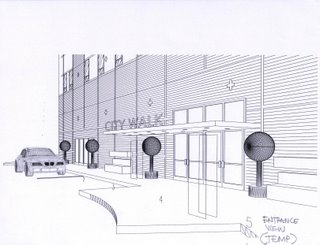
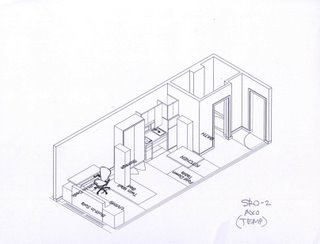 The public meeting last night went very well, or so it seemed to me. Over 100 attended. We found ourselves packed into the chapel at First United Methodist Church downtown--great setting for a conversation about the future of this project and of our city regarding very low income persons.
The public meeting last night went very well, or so it seemed to me. Over 100 attended. We found ourselves packed into the chapel at First United Methodist Church downtown--great setting for a conversation about the future of this project and of our city regarding very low income persons.My thanks to Dr. John Fiedler, Senior Minister at the church. John is doing a great job through his church and in our community.
To read a report on the meeting written by Dallas Morning News reporter, Kim Horner, go to:
http://www.dallasnews.com/sharedcontent/dws/news/
localnews/stories/DN-highrise_21met.ART.State.Edition2.3e3bdd8.html.
Keep us in mind as we head toward the next step in the project--Tuesday, March 28 and another meeting with the Dallas City Council.
Monday, March 20, 2006
Chief Health Equity Officer
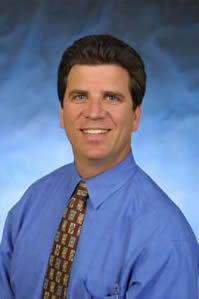

My dear friend, Dr. Jim Walton recently received a notable promotion. Actually, it is an amazing development.
Dr. Walton has served as the director of community health improvement for the Baylor Health Care System. His position has been "nested" for several years inside Health Texas Provider Network, the physicians group that serves the entire Baylor system.
We've known each other since 1997. My life and our community have been made richer and healthier because of this friendship. All of our community health services improvements have come as a direct result of Jim's hard work, leadership, vision and willingness to spend his own social and professional capital on behalf of our community.
Jim is the resident expert inside Baylor for community health concerns, improvements and issues. He has literally traveled all over the world working, consulting and healing.
But, back to his promotion.
Recently, as a result of major internal study and realignment of resources, the Baylor Health Care System named Jim their Chief Health Equity Officer.
Making an institutional commitment to equity inside a health care system like Baylor is major news.
By taking this step, the Baylor Health Care System is saying it will commit time, vision and resources--basically, whatever it takes--to increase access, attack health outcome disparities and level the health care playing field for low-income persons and for ethnic minorities who suffer for a lack of equity in health care practice and delivery.
Dr. Jim is already off and running!
I know he is excited.
I know he is proud of the Board of Directors at Baylor.
I know I am proud of him and of everyone over there. We have no better community partners.
We look forward to expanding our role with Dr. Jim, with Baylor and with anyone else concerned about fairness and justice in health care.
Congratulations, Doc! We love you!
Sunday, March 19, 2006
Religion and Politics
Of course, this tension is nothing new in American history. The fierce emotions related to faith and governance have been present from the very beginning.
Recently, Steven Waldman made this statement in Slate, the online magazine:
"As you already know, one of America's two political parties is extremely religious. Sixty-one percent of this party's voters say they pray daily or more often. An astounding 92 percent of them believe in life after death. And there's a hard-core subgroup in this party of super-religious Christian zealots. Very conservative on gay marriage, half of the members of this subgroup believe Bush uses too little religious rhetoric, and 54 percent of them believe God gave Israel to the Jews and that its existence fulfills the prophecy about the second coming of Jesus."
Surprisingly, to many I am sure, the group Waldman describes is the Democrats. The "hard-core" subgroup is African American Democrats.
When I was a much younger man, I remember reading everything Mark Hatfield said or wrote. Hatfield served as one of Oregon's two Senators for years. He happened to be a Republican. He was also a devout Christian who cared about poverty, justice and human liberation.
Things have narrowed a great deal since 1980.
I long for a new day when we can recognize and acknowledge the faith-inspired values of people whoever they are, no matter what their party affiliation.
No one political party has a monopoly on faith and the connection of faith to public policy formation.
The values of the various faith traditions at work in our country cover a broad spectrum of issues and concerns that, if taken seriously, could transform our culture without shutting anyone out or cutting anyone off.
No one party is "the party of faith."
Beyond values and faith, wouldn't it help us to acknowledge the fact that none of us and neither of our major political parties have the absolute truth on any issue?
Isn't it true that we might actually benefit from listening to each other? Might we not make more progress together if we gave each other a chance through honest, open dialogue?
Something to think about.
Saturday, March 18, 2006
Rainy Day Saturday Musings: On Not Liking the Poor
Just need to make an observation or two about poor people and the rest of us.
We've been working several months now on the acquisition and redevelopment of an old, abandoned, downtown office building here in Dallas. The project has been a long shot from the start for a number of reasons. Financing the deal immediately comes to mind, but we have a plan and there is a chance it could work out.
The building has been vacant for almost 15 years. It is a mess inside and out. It has great potential, but those who tried to sell it as an upscale condo project gave up several years ago.
What has been even more interesting than the financing plan and the architectural studies, are the attitudes we have uncovered here in Dallas about poor people in general.
Dallas prides itself in being a city of faith, goodwill and compassion.
In many respects I suppose it is.
But, I am noticing something a bit disturbing.
The closer we move to really doing something significant for very low-income persons and families, the more objections we get about "the problems these kind of tenants" will bring with them to a property.
The emotions are fascinating to watch.
People are afraid.
Some fear that their property values will decline if the poor show up downtown as permanent residents.
Somehow being on the street is better than being in the neighborhood as a resident.
Or, for the working poor, having them ride the rail or bus downtown to work is much better than having them live here all of the time, I mean even after work hours.
Some have told us they fear that the people who would lease our small units would come with "physical and mental problems" that we just couldn't handle. Like the decision to rent a small, high quality apartment in itself means that a person is somehow "troubled" by definition.
Dallas loves shelters.
Well, not really.
But we do love controlled places.
Spots where we can show up, sometimes with our children in tow, and do nice things to and for people. It makes us feel useful and good. Then, we can go out to eat before driving home to our more comfortable and familiar surroundings.
We really don't know much about shelters.
We don't realize that shelters empty people out on the street every morning and don't re-open until evening. Sort of a group hotel with extreme check in, check out policies.
We are good at lumping poor people as well.
Not all poor people live in shelters.
Many work. Many work hard at more than one job.
These people will keep the restaurants, museums, churches, upscale condos, boutique hotels, and coffee shops humming for those of us who work and travel downtown. This important labor force will need decent, affordable places to live like the rest of us.
By the way, do you know what a full-time worker paid minimum wage today earns in gross wages in a year?
If you said, "$10,700," you were correct.
Downtown is attractive because of the transit system and the environment.
Most poor people don't own cars. The bus and rail system downtown is cool for everyone.
Believe it or not, poor people enjoy art, bright lights, churches, parades and street concerts just like the rest of us!
I am deciding that if the truth were known, we don't much like poor people here in Dallas. Or, maybe to be fair, I should say we don't like them nearby.
I mean, after all, good Christian people living in a good Christian city like this one surely like the poor.
Right?
So, I know that's not it.
It's just that we've found life works better for us and the poor if we keep our distance.
Maybe this strikes at the root of our real problem. I wonder if we even know any people who are poor?
Friday, March 17, 2006
My materialism

Time to come real, way clean here.
I am materialistic.
I love stuff.
If I had more money, it would be worse with me than it is.
I struggle with things. I enjoy nice, high-quality things.
I catch myself going to Barnes and Noble to browse and buy books. Cool enough, right?
Yes, but I find myself being "medicated" by my purchases at times.
Stuff and consuming stuff equals escape and relief.
I have to face the fact that I do what I do professionally, at least in part, in an attempt to control my addiction to things.
I like to consume stuff that is sort of weird really.
I mean, I really enjoy fountain pens--nice ones!
I can get into clothes too. I've been known to buy a house faster than a new necktie! Go figure!
I love model cars--diecast replicas of one of my personal passions--the automobile, either cars or trucks.
I love speed--not the drug, but the "behind the wheel" kind.
I'm a NASCAR, Indy Racing League grand dad!
If I had my way, I'd go out today and buy a new Corvette. Have you seen the Z06 models?
Sweet!
I own a 1953, fully restored Chevrolet 1500, five-window pickup (see photo above).
My truck is a rebuilt street rod with a 327 Chevy V-8 attached to a 350 Chevy rear end. The little red machine can move out! I have restored the interior with pleat and roll everywhere.
I enjoy my truck.
Trying to figure out my addiction to some of these things is a bit maddening. I'm sure it goes back to my Mayberry childhood. I don't know.
All I am saying here is I know the dimensions of my struggle. I am trying to battle through it because I know that I don't really need anything.
Lots of people I know need many things--much more basic in nature than most of my consumption concerns.
Part of my struggle is about guilt--classic, white, middleclass shame in face of what I know about my city, my nation and the world. I am repelled by that.
At the same time, I know part of it is "right on" as I try to really listen to my heart.
Part of it is a natural, God-given appreciation for beauty and craft and fineness.
I am trying to walk the tightrope. Sometimes I go into free fall until I find the net and I start all over.
How about you?
Can you relate?
Thursday, March 16, 2006
Coordination of Efforts--People Matter

Last Sunday I spoke to a really good church out in Southlake, Texas--to be more exact, the church is located in Trophy Club, Texas.
My assignment meant that I had to drive out Highway 114 to Southlake and back to downtown Dallas--almost 70 miles round-trip.
On my way back into the city, I had a surreal moment on the freeway.
Work with me here to "get the picture," okay?
Garrison Kellior is bringing his "Prairie Home Companion" program (a re-run taped in June 2004) to a close by leading his New Hampshire audience in singing "America the Beautiful."

I am flying down the highway along with some really amazing automobiles--Porsche SUVs, Mercedes Benz, BMWs, Lexus of various sorts, the list of high-priced cars could go on and on. Cars occupy the space in my soul labeled "Vice," so, I notice cars believe me!
To the right and to left I pass retail shopping of every variety, laid out in malls, new urban strip centers and impressive free standing buildings.

Upscale housing for lease and for sale appears plentiful, with more being built everywhere out on what was once prairie and cotton farms.
Shining office buildings dot the drive and become more concentrated as I glide through Los Colinas. The national headquarters of several companies make their corporate homes along this concrete ribbon of industry and wealth.
Then, the skyline of Dallas emerges out of the haze.
Really an impressive silhouette against the horizon.
All the while, Garrison is signing his heart out with his audience.
The message comes to me so clearly.
In a city like this one, there is no reason for any child to grow up in poverty.
No student should drop out.
No family should have to endure sub-standard living conditions.
Everyone should find work that pays a fair and livable wage--every single laborer.
No man, woman or child should need to worry about health care or food or transportation.
Hopes should never be crushed in such a wealthy place.
This city and this nation are indeed beautiful.
As I drove along, lost in thoughts about my work and the people I know as a result, it occurred to me that I love this place. I really love it.
But we should be doing better, much better.
And, you know what? We can do better.
But, things must change.
What is needed is a coordination of resources, efforts, heart and opportunity.
Public sector and private sector must come together with a new will to bring equity and fairness to our city--to every corner of our city.
Until every resident of our city understands and believes that he or she matters and matters a great deal to the rest of us--because of the way our community operates and treats all residents--we will not see the improvements we need so badly.
It is not popular these days to say so, but the government must step in and take charge of some issues and relationships.
We will not get the job done unless things are coordinated for the greatest good of the most people.
And yes, sometimes such decisions will be made at the expense of the few who also are the very well off.
America is beautiful. However, the beauty and the opportunity must be shared much more widely.
My drive last Sunday brought this home to me.
It also screamed, loud and clear, that we have more than sufficient resources to do what needs to be done.
Wednesday, March 15, 2006
New Friends from Cote d'Ivoire

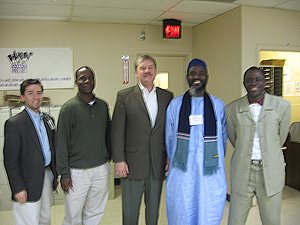
On Monday, we enjoyed the company of a delegation from the Ivory Coast, West Africa.

The Reverend Oguie Ohua Augustin (a Catholic priest), Al Hadj Kone Ibrahima (an Islamic leader) and Ouattara Koffi Tehua (an Evangelical leader) were accompanied by two translators from the U. S. Department of State.
All are traveling across the United States as part of the U. S. State Department's "International Visitor Leadership Program," designed to increase understanding between other nations and the United States.
Their particular excursion was arranged by the Institute of International Education and carried the official title, "Religion and Community--A Project for Cote d'Ivoire."
Prior to their arrival in Dallas, our new friends had spent a week in Washington, D.C. and several days in New York City at the United Nations.
The purpose of their trip was to gain information regarding how faith-based organizations manage delivery of social services to people in need. The recent history of their country and its terrible unrest provided an urgent feel to our conversation. Civil war tends to magnify every "normal" problem by a factor of at least 10. The Ivory Coast has been locked in internal, violent conflict since 2002.
Our visit was more than fascinating.
As we talked, it became very clear to me that the problems we face, both here and in their nation, are very much the same.
No doubt, the depth and intensity of the challenges facing the poor in the Ivory Coast are greater than what we face in Dallas. And, again, the political climate and the instability of life and institutions there greatly complicate every issue and every strategy.
Still, the issues are basically the same.
Furthermore, the faces of the poor reflect the same kind of despair and hope.
Our conversation worked well and proved stimulating, even through our French translators.
We talked about funding, the role of government, the significance of American corporations here and in their nation, the place of faith communities and the importance of building international friendships among small groups of people like us.
Talk about an engaging hour!
These special leaders enjoyed a tour of several of our locations around the city.
I believe they left feeling as if we had assisted them in several ways.
I know that they helped and inspired us.
One additional thing I know: we are all the same, we really are.
I am learning that this realization is essential to being effective in an urban context. I expect it is also useful in developing an adequate view of the world.
There is no place for arrogance in life today.
As I reflect on our guests and our amazing visit, it is clear that humility, human kindness and a passionate desire to really connect made arrogance impossible in our little conference room at 409 N. Haskell.
Tuesday, March 14, 2006
Outsourcing Justice

Over the past couple of years the State of Texas Department of Health and Human Services has been reorganizing and streamlining (read "cutting back on programs for the poor" just here).
If you ask Albert Hawkins, the Commissioner, the reason is simple: the state wants to gain efficiency and get more bang for its buck.
You would think that would mean serving more people with the same amount of money, right?
Apparently not.
One of Mr. Hawkins' tactics has been to set about outsourcing the delivery of services to Texas' poorest families.
Central Dallas Ministries participated in the ramp up to this outsourcing by consulting on several occasions with Accenture, the company that eventually landed the contract to serve the state's health and human services needs.
The plan involved the aggressive implementation of technology, purportedly to make certification and registration faster and more accessible to the people who needed the services.
The idea sounded really good to me as we discussed it.
We even talked of kiosks in places like a few of our locations here in Dallas that would make the delivery of services much easier and more seamless for those who were eligible.
Well, so far, all I can say is. . .
"Wrong!"
"Wrong!"
"Wrong!"
Take one aspect of the outsourcing company's new assignment: Medicaid, the health insurance product for poor children, disabled persons and the elderly.
That would be the youngest, the oldest and the weakest?
Got it?
Since November 2005 and through February 2006, the number of children receiving the Medicaid health insurance benefit in the state dropped by almost 79,000 participants.
Further, this sharp decline occurred over three consecutive months--the first 3-month decline since May 2000.
Maybe what we have here is a new system, still a hybrid with the old, trying to get the "kinks out."
But I have my doubts, serious doubts.
The fact is, in Texas, the poor are being squeezed from two sides.
On the one hand, the federal government keeps cutting into Medicaid and other Health and Human Services benefits--in many cases severely and unjustly.
On the other, here in Texas, a new management system kicks tens of thousands of the poorest kids off of health care benefits.
And these numbers don't count the sharp decline since December in the Children's Health Insurance Program (CHIP)--a plan designed to serve those children just above the poorest in the state.
The CHIP program is in decline even though the legislature restored funding and approved program expansion during its last session.
Maybe the program will smooth out.
But then, maybe it won't.
Here at Central Dallas Ministries we have watched the Medicaid program for at-risk pregnant women and children decline to almost a trickle of real, meaningful assistance.
This radical cut back that slashed a very valid, needed program has been accomplished strictly administratively, again, thanks to Mr. Hawkins.
The cuts were so blatant that the U. S. Supreme Court ruled against the State of Texas last year, forcing Mr. Hawkins' department to make changes in the way this particular program operates.
We'll see if he defies the highest court in the land. So far, changes appear miniscule to our staff.
In the meantime and overall in our state, thousands of our children go without medical care, expect when things get so bad their parents resort to emergency rooms. Not a smart way to deliver primary health care services to the poor.
I'm going to keep watching. But, I'm not impressed.
Does faith have anything to say to this situation?
Sunday, March 12, 2006
Shelter and Hope
Our team of housing developers here at Central Dallas Ministries appreciates the support we are receiving from our major local newspaper, as well as from the Dallas City Council and our mayor, Laura Miller.
It seemed appropriate to post the editorial in its entirety.
The next two weeks will be a critical period to the success of our endeavor to bring high quality, affordable housing to downtown Dallas.
_________________________________
Shelter and Hope
Tower for homeless holds great promise
12:00 AM CST on Saturday, March 11, 2006
Not to insult anyone's intelligence, but the problem with the homeless is that they don't have places to live. We're talking here about the problems they cause for the rest of us – primarily making us uncomfortable by loitering, panhandling and doing things in public that should be done in private.
Undoubtedly, many other problems contribute to their plight, chiefly mental illness and addictions. Those also must be dealt with if their numbers are ever to shrink. But No. 1, as far as solving our problem with the homeless, is creating places where they can live until and while those other issues are addressed.
That's why Central Dallas Ministries' plan to turn a 10-years-vacant office tower into affordable units for homeless and low-income people is potentially very good for downtown Dallas.
Like everything else in life, it must be done well to have real value. Shoddy work produces shoddy results. But in principle, Central Dallas Ministries has hit the nail squarely on the head.
The City Council has already endorsed this strategy by including money for such projects in the bond proposition that will fund the new homeless assistance center (which is designed to provide the services homeless people need). Central Dallas Ministries is requesting $1.75 million of that money for its project at 511 Akard, which would include 209 residential units as well as ground-floor retail and two floors of offices for the agency itself.
Look at it another way: If the city can spend $70 million to redo the Mercantile complex and nearby buildings as residences for affluent people, why can't it spend $1.75 million on residences for people who desperately need the help?
Some will say: Yes, but let's house the homeless somewhere besides downtown. The editorial board is willing to bet that City Hall's doors would be open if those voices showed up with their own proposal to raise $17 million from other sources (as Central Dallas Ministries is attempting to do) and build the same number of units away from downtown.
If fact, here's a thought: Go for it.
Saturday, March 11, 2006
Progress


During our recent KaBoom! playground build, we met "Bobby" (not his real name), a great neighbor who helped us all day.
He lived near the lot that we transformed into a safe place for children to play.
As we were working, it became obvious to some of our team that Bobby was really into the day and the work. He was clearly amazed at the transformation our effort produced in this once vacant lot.
Visiting with him, we learned why he was so engaged.
"I used to sell drugs on this lot," he confessed.
Bobby had gotten his life together thanks in part to Victory Outreach.
He was still very involved in the recovery process. But the change happening before his eyes meant so much to him.
It was as if he was watching the reality his own life change right before his eyes.
The old memories of addiction, pain, fear and need were being wiped out by the emerging health, cooperation and power of his community at work on a place of play.
It was amazing to observe.
"You can't believe how much better this is," Bobby observed. "This lot has been a dangerous place. It's like, it's gone now!"
He was right.
The old was disappearing. In its place a brand new space with a completely different purpose.
Life shoving out death.
When we were finished, he celebrated with the rest of us.
The playground means so much to so many people. It is obviously a symbol of hope, power and progress for everyone, especially those with stories like our friend Bobby.
By the way, since we've installed the seating around the park, adults have been seen out in the fresh air reading their newspapers!
I love this neighborhood!
Friday, March 10, 2006
Race and Development

 Institutional racism robs our cities of power.
Institutional racism robs our cities of power.On Monday of this week, I listened as District 8 City Councilman James L. Fantroy reported that over the past very few years over 7,000 new homes have been built in Dallas' "Southern Sector" with more on the way!
He went on to tell me in a private meeting that as soon as lots are developed, they sell and homes mushroom from the ground.
Rooftops convert to retail opportunities.
Retail opportunities mean new business development, jobs and accessibility of goods and services for, in this case, historically underserved communities.
City Manager, Mary Suhm chimed in that in the case of the "Southern Sector" here in Dallas, redevelopment of the inner city is occurring from the outside in.
In other words, development around the edges of our southern inner city neighborhoods is going to impose health and new vitality on some of our most challenged and impoverished communities.
That is all good, good news.
For years institutional racism propped up delaying tactics that effectively blocked investment to the south here in Dallas. Our political, financial and legal systems assumed that low-income people, especially black folks, made bad investment partners; that African American neighborhoods were simply too risky for developers; and that such neighborhoods were simply "lost causes."
Underneath it all was the unspoken sentiment that "those people" didn't need or desire and simply wouldn't support what the rest of the community took for granted.
Experience in Dallas today is revealing what a narrow and wrong-headed notion all of that was!
Sadly, African American individuals and predominately African American neighborhoods are held to a higher standard or test than are other areas of our city when it comes to investment potential--one more proof of the racism that we still must overcome.
The same is true for neighborhoods with majority Latino populations.
Justice is served in a delightful manner when forward thinking developers, venture capital partners and lenders break through the folly of our past behaviors, ignorance and fear to enjoy great reward and amazing success by responding to real and growing market forces in traditionally neglected communities.
We have a long way to go, but thankfully, the tide is turning, or so it seems to me.
Thursday, March 09, 2006
"Pops"



So, how do you fill up an apartment building once you build it?
It is a concern I have today.
Don't get me wrong.
I don't think it will be hard at all. There are so many people who need high-quality, affordable housing in this city.
I know that once we have our City Walk at Akard project finished, we will work with partner organizations to identify, screen and lease apartments to 200 wonderful people.
But, we have a long way to go before we arrive at that point--approximately 2 years, I expect.
In the meantime, I find myself conducting informal "street interviews" with homeless people.
After the City Council meeting on Wednesday, as I drove back to my office, I spotted four gentlemen sitting on a sidewalk leaning up against a wall just down the street from City Hall. I confess, I hung a quick U-turn, parked my car and went over for a conversation.
Three of the four were instantly friendly after I introduced myself and extended my hand--surprised, but very friendly.
The fourth gentleman was a bit suspicious of me--understandably, but he warmed as we talked.
Of the four, the oldest man stood out.
"I'm 'Pops,'" he said, beaming.
"Nice to meet you," I replied.
I conducted my simple survey/interview.
"If I could take you to a really nice, but small and affordable apartment, complete with your own bathroom and kitchen and then, if I helped you find a way to pay for it each month, would you be interested?" I asked my new friends.
Of course, they all said they would be much more than just interested.
"I get a check," Pops chimed in. "But, it is real small."
"If I could ask without intruding, Pops, could you tell me how much your check is each month?" I continued.
"Well, like I say, it ain't much. It is only $541.00 a month," he informed me.
We talked for a few more minutes and I shared with him how we could make that income level work in our new project and how he could be very helpful in building the community we had in mind.
He smiled a smile I will not soon forget.
I wished my buddies well and I was off.
But, "Pops" is on my mind today.
How would I do on $541.00 a month? Let's see. . .$6,492.00 annually.
If I am alone and if I can't find anyone who will hire me and if that is my total income, where do I go and what in the world do I do? To whom do I turn? Where do I sleep tonight?
Pops' homelessness came into clear relief for me on that gray sidewalk in the shadow of the center of Dallas government and public policy formation.
When my energy flags a bit or when the process turns uphill, I will remember him, his face and his heart.
I need to get to know "Pops," and he needs to get to know me.
I pray I get the chance.
_________________________________
For an update on Central Dallas Ministries' progress on City Walk at Akard, go to this Dallas Morning News link for today:
http://www.dallasnews.com/sharedcontent/dws/news/localnews/
stories/DN-homelesstower_09met.ART0.East.Edition2.50b6d49.html.
Wednesday, March 08, 2006
Developing Dallas Fairly
http://www.dallasnews.com/sharedcontent/dws/dn/
latestnews/stories/030706dnbusakard.d0d4690.html.
We have another hurdle to deal with today as our proposal comes before the entire Dallas City Council.
We need the council's "go ahead" in order to move forward with our low-income tax credit application to the state of Texas.
Remember us.
___________________________
On Monday, I sat through a long meeting with our City Council's Committee on Housing and Economic Development.
Everytime I am in a setting like this, I realize just how challenging the management of cities can become.
For almost an hour, members of the city staff laid out the challenge facing Dallas because of the severe cutbacks in funding for Community Development Block Grant (CDBG) programming.
Last year's funding level came in at approximately $29.5 million.
Funding for next year will reflect an almost $10 million cut at $19.8 million.
Over the past few years CDBG funds in Dallas have been consolodated and focused strategically to achieve the greatest overall impact for community renewal.
These funds originate in the U. S. Department of Housing and Urban Development and are used locally on housing development, land acquisition, public improvements in low income neighborhoods, child care, business development, home repairs and a number of other essential initiatives.
The Bush Administration has been steadily cutting back on CDBG funding. The President's proposed budget for FY2007 would completely eliminate the program nationwide.
Bad move.
Just ask Mary Suhm, Dallas City Manager and her staff.
Even better, ask my neighbors whose environments are made healthier and safer by the programs we will surely lose unless things change.
Tuesday, March 07, 2006
Mayberry

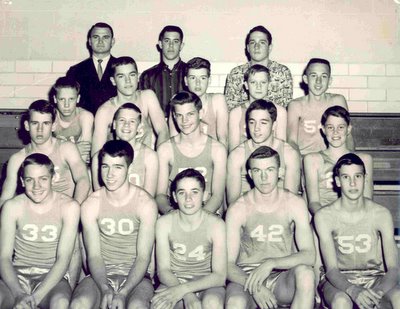
I grew up in Mayberry.
The city limit sign read "Richardson," but take my word for it, my hometown felt, looked and behaved a whole lot like Mayberry.
I suppose it was the death of Don Knotts last week that sent me back down memory lane.
Growing up in Richardson I experienced so many of the same things as I can now watch in old Andy Griffith Show reruns. And, I confess, I watched a bunch of those old shows last weekend on TVLand!
We moved to Richardson, just north of Dallas, Texas, in 1953. Back then the place was just a sleepy little town of around 1,200 people.
There was one school house where 1-12 grades got along just fine. By the time I started school, things had changed as the new high school and a new elementary school opened. But I began my education in that old red brick school house down on Greenville Avenue. I suppose folks just couldn't bring themselves to tear it down since it now serves as the Administration Building for the entire district.
Until I was 12-years-old, and a good bit beyond that time, a kid could easily ride a bicycle from one end of town to the other and back in just a few minutes. Traffic wasn't much of a problem.
Everyone knew everyone else. A kid couldn't get by with much as a result! All the adults seemed to know to whom all of the children belonged.
Everyone worked. Few people seemed rich and few were truly poor.
Divorce was very rare. Families seemed strong, though I know things weren't perfect behind closed doors.
As a little boy, I knew the Fire Chief, Dick Russell and the Police Chief, J. W. Golden. I knew the Postmaster, George Kemp, a good man who died recently in his 90s.
I also knew the barbers, the sanitation workers, the teachers, the ministers and the guy who printed the newspaper. What is more important, they knew me.
My dad went to work as the town's first, full-time administrator in 1953. He was City Secretary. He helped write the city's first charter of government that laid out a council/city manager style of government for the town.
By 1959 he had gone to work for a couple of really bright and aggressive real estate developers, Lindsay Embry, who passed away not long ago, and George Underwood. Their company basically developed all of the west side of Richardson from south of Belt Line Road to Campbell Road on the north. They sold thousands of lots for new home construction to accommodate the boom town growth that Richardson experienced beginning in the mid-1960s.
As I do my work now, I often tell people that the mission of Central Dallas Ministries is to create Mayberry all over Dallas.
Don't get me wrong.
Growing up where I did was not perfect. The racism was so much a part of the fabric of the place that I had to leave home to get in touch with its power. And things didn't work exactly right for everyone.
But the good things, those are the community qualities we are trying to replicate in the inner city today. Things like committed connection to neighbors, devotion to the education of children, safety for everyone, economic opportunity, consistent civic engagement, solid moral values and simple love for fellow human beings.
I think about Mayberry a lot. I was most fortunate to have experienced such a place growing up.
Every child in the country deserves the same.
[By the way, extra points if can you find me in the photo above. Eighth grade basketball team, Richardson Junior High Mighty Falcons with Coach Jerry Phillips at the helm! We won our district that year.]
Monday, March 06, 2006
This Week. . .

Today begins what could turn out to be one of the most important weeks in the history of our little organization.
This morning we have important meetings with three Dallas City Council members.
Following these meetings, we will sit in on a council briefing provided by city staff. Among other issues will be a presentation of our downtown housing project to the council's committee on economic development.
Then, on Wednesday the full council will take up our project. We need these elected leaders to provide the "go ahead" for our low-income tax credit application with the Texas Department of Housing and Community Affairs in Austin. Without council approval our current plans will be finished!
So, we face a week filled with important meetings and big decisions.
Hanging in the balance will be a project that would provide new hope and real stability for some of our city's lowest income citizens.
At the same time, the project will allow us to expand several of our other initiatives. When completed, the new development will provide office space for about 40 of our team leaders.
Our plan is creative, engaging, forward-looking and neighbor-sensitive. It should be supported. Our city needs what we have planned.
Please remember us this week.
Sunday, March 05, 2006
Entitlements
Given that, our leaders have sliced away billions of dollars in support of so-called "entitlement programs," such as Food Stamps, Social Security, Medicaid, Medicare, Temporary Assistance to Needy Families (TANF), Veterans' pensions and health care, housing, child care, employment training--the list goes on and on.
The anti-entitlement thinking goes something like this:
"Too many people feel as if they are entitled to being cared for, as if it is their right."
"This trend has got to stop or be severely curtailed."
"Those people are going to bankrupt the nation and destroy our economy."
No doubt, some changes and reforms in these and other programs of support and uplift were needed and justified.
But, now we have gone way too far in cutting back expenditures that benefit the poor, the weak, the young and the elderly.
We are in danger of undercutting the future health of our nation and its democracy due to the extremes to which we have gone.
Ironically, much of the change has been spearheaded by the very groups of Christian people who claim to respect the Bible most--some Evangelicals and many Fundamentalists. They seem eager to discuss values, so long as we don't include poverty and those its devastates on our agenda for conversation.
The words of the Bible itself bear witness to the values of God and the people of God across the ages.
The Bible makes it clear that God regards the poor as having very clear rights.
So far as the God of the Bible is concerned, the poor are entitled to certain benefits and treatment by the more well off and particularly by those in charge of the political process.
A couple of examples will suffice for now:
"How long will you defend the unjust and show partiality to the wicked? Defend the cause of the weak and fatherless; maintain the rights of the poor and oppressed. Rescue the weak and needy; deliver them from the hand of the wicked." Psalm 82:2-4
"Woe to those who make unjust laws, to those who issue oppressive decrees, to deprive the poor of their rights and withhold justice from the oppressed of my people, making widows their prey and robbing the fatherless." Isaiah 10:1-2
From these and other readings we must conclude that the poor have rights. Thus, for people of faith, the poor are entitled to fair treatment and to those benefits that can lift them from their poverty and/or protect them from further oppression at the hands of the powerful.
Before jumping on the anti-entitlement bandwagon,we would be wise to reconsider the clear instructions of those materials that inform our faith. Just a thought.
Saturday, March 04, 2006
Priscilla
She came into the Food Pantry on Haskell Avenue with her young son, Jesse. She needed food and assistance with rent or utilities, as I recall.
Her life had not been an easy one. The years had worn hard on her. She appeared to be older than her actual age. Her face was lined with a kind of worry and pain that I had seldom, if ever, seen before.
Her first visit was over ten years ago.
We were in the early stages of "re-tooling" how we did our work.
She came just as we were turning our Food Pantry ministry over to the community--to the people who used it. Everyone who came in was asked to come back and volunteer. In a very short period of time we had more volunteers than we knew what to do with. Almost all were men and women who depended on our services in one way or another.
The "poor" were running our shop. We continue to operate our Resource Center (aka "Food Pantry") in the same manner today.
Priscilla started to come every day.
In the beginning, she didn't have much to say. She was so meek and quite. She didn't say much to anyone.
But as she became accustomed to our environment, she opened up. In a short time she became one of our best volunteers. She became a leader among us.
She seemed to know everyone in the neighborhood.
She could spot a "con" a mile away--there had been a bit of that nature in her own life at one time she once told me.
She became so vital to our work that at one point for a period of time she earned a job on our team. She was in charge of custodial services and she helped us generally keep the place moving.
She learned and mastered almost every function in our center. We came to depend on her as a trusted partner and leader.
She became involved in our little community of faith in the church that meets here. She was almost always present on Sundays and helped host the meal we served each week back then.
Following her life and her progress was fun--better, inspiring.
I remember her asking me one day if she could borrow a set of our "Hooked on Phonics" tapes and workbooks. She wanted to learn to read.
She would listen to the taped lessons as she ran the vacuum cleaner in the two buildings we operated at that time.
Before too long she approached me one day and asked me to sit down. I did as I was told and Priscilla stood before me and read from a book! She had taught herself to read.
Tears flowed that day!
Priscilla continued to grow and become stronger as a person. Lots of things happened to her and she touched many people.
As she continued her growth as a person, she began moving away from our community. She landed a better job with another organization, and after awhile she disappeared.
She and Jesse would stop in from time to time to catch up and tell everyone hello.
Our community continued to change and turn over. We lost track of her. I suppose the last time I saw her was two or three years ago.
This past week Jesse dropped by to tell me that his mother was dying of cancer. I had already heard the news from a mutual friend.
Yesterday Priscilla died.
She lived and died as a relatively poor and humble person.
But her life counted.
She used her talent to benefit her community and her world.
Tears have flowed over the past couple of days. More will follow.
I'm thankful that I knew her.
She touched my life. I am better for having known Priscilla.
Friday, March 03, 2006
Good Lawyers

John Greenan and Ken Koonce are really good guys who also happen to be extremely smart and excellent attorneys. Both have enjoyed productive careers in large, downtown law firms here in Dallas. John graduated from law school at the University of Minnesota, Ken from Pepperdine University.
In late 1998, both decided that they wanted to do something completely different with their time, talents and lives. At that time they didn't know each other.
Both found their way to Central Dallas Ministries and in February 1999, they helped us establish our public interest law firm, Legal Action Works or the LAW Center.
The mission of the LAW Center is to represent people who cannot afford counsel, primarily in civil matters.
Last evening we enjoyed a celebration reception honoring the accomplishments of the firm. The track record since the beginning has been impressive.
--1,675 of our neighbors have been advised through the end of 2005
--1,100 cases have been accepted and closed
--79% of the cases involve family law
--21% some other civil law matter
--Of the family law clients, 40% are escaping family violence
--Demographically our clients are 80% female; 41% Hispanic; 30% African American; 26% Caucasian
--The LAW Center provides bilingual staff, since 20% of our clients speak Spanish only
--10% of our clients are undocumented immigrants
--In the last 3 months alone, our actions have brought stability to the lives of 69 children
--During the last 6 months, our lawyers have secured child support judgments in the amount of $1.2 million
--Our team tackles difficult and complex cases, with 33% of the cases actively contested
--7% of our cases go to trial
--Since January 1, 2006, we have opened 45 new cases
Much has changed since the beginning days. We now have 5 full-time attorneys. In addition to John and Ken, our team includes Janice Schwartz, Natalie Gregg and Jennifer Fogel. We also have four support staff members.
Currently, four of our attorneys have 175 open cases working.
John Greenan has shifted the majority of his work toward developing fit and affordable housing through the efforts of the Central Dallas Community Development Corporation, which he leads as Executive Director.
The LAW Center owes its origins to many supporters. Had it not been for the vision and generosity of Jim Sowell, this firm would not exist. In addition, the commitment of the Koonce Family Foundation has joined from the start to underwrite a significant portion of our effort. We are grateful for these urban leaders!
Our little firm is a bustling place!
Great and liberating work goes in the courts of Dallas because of these good lawyers!
Thursday, March 02, 2006
Ashes
Across and down my forehead;
Clear directives for action;
Renewed protection for
Spirit and Body.
"Repent"--make a change!
Do not delay!
Do not deny!
No time for disconnection!
Do not avoid, but see, at last, see!
"Believe the Gospel"--make the story yours!
Embrace the good news!
Open your heart!
Open now your life to this community!
See, at last see, those who wait for you!
Change--bold change directed for me,
Radical and to the root;
New directions demanded by a community's
Fierce pain and confusion;
Repent! All of us!
Ashes smeared on confused lives
Longing for the hope.
Delivered by even a thought
Of Good News--
Desperately needed, Good News!
Kneeling to receive
the mark of Cain,
Transformed by the clarity
Of hope and change--
A knowing welling up inside.
Ashes, smudging life
With the mark of a call to matter
In the pain and struggle,
To rise up renewed, to do Justice,
Challenged to be about Jubilee.
In the quiet,
Ashes and soft, certain words
Compel my heart,
The time is now, not later;
Rise up and act--Resurrection comes!
Wednesday, March 01, 2006
The Children






Forgive me for continuing to talk about our new neighborhood playground, but, frankly, it is something else!
And not just because it is high quality, which it is. What makes it all work are the children.
On Monday, after the concrete had "set up" properly, we were able to open it for the kids.
Keith Ackerman and Jeremy Gregg arrived at our transformed lot just as school was letting out. When the kids arrived home, he explained that he needed help taking down the temporary fencing and the yellow barrier tape. Once that job was completed, he explained, they would be free to play all they wanted on "their new playground."
Like eager beavers the children helped Keith open the new facility.
The entire build project was positive. We made many new corporate, political and celebrity friends thanks to this effort.
But, the ultimate payoff is with the community--our neighbors and their little ones!
Enjoy the joy. . .and the progress!
